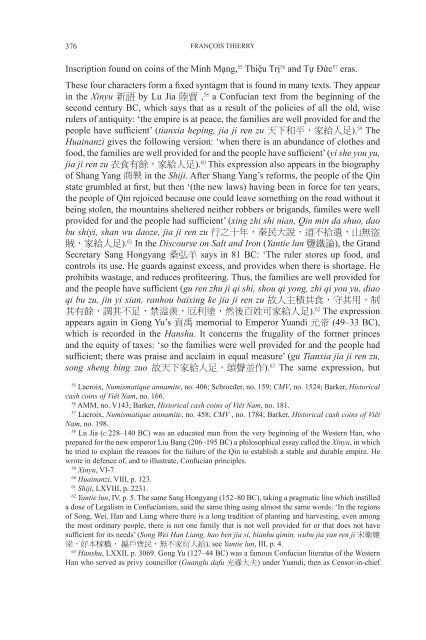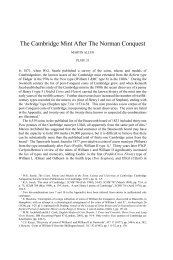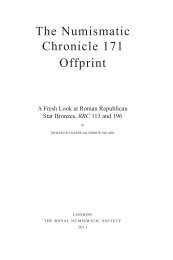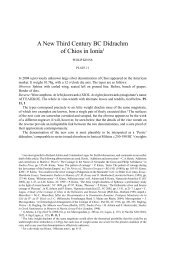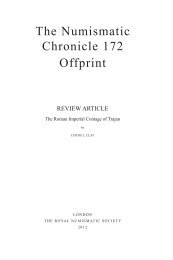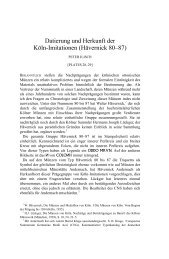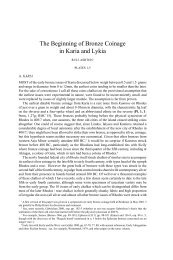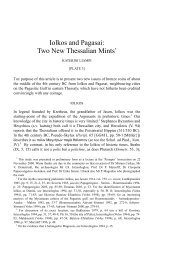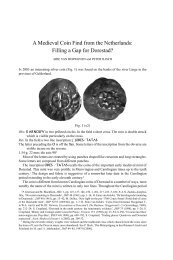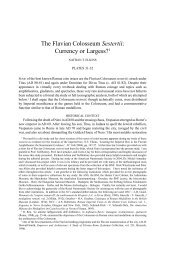The Numismatic Chronicle 171 Offprint - Royal Numismatic Society
The Numismatic Chronicle 171 Offprint - Royal Numismatic Society
The Numismatic Chronicle 171 Offprint - Royal Numismatic Society
Create successful ePaper yourself
Turn your PDF publications into a flip-book with our unique Google optimized e-Paper software.
376<br />
FRANÇOIS THIERRY<br />
Inscription found on coins of the Minh Mạng, 55 Thiệu Trị 56 and Tự Đức 57 eras.<br />
<strong>The</strong>se four characters form a fi xed syntagm that is found in many texts. <strong>The</strong>y appear<br />
in the Xinyu 新語 by Lu Jia 陸賈 , 58 a Confucian text from the beginning of the<br />
second century BC, which says that as a result of the policies of all the old, wise<br />
rulers of antiquity: ‘the empire is at peace, the families are well provided for and the<br />
people have suffi cient’ (tianxia heping, jia ji ren zu 天下和平,家給人足). 59 <strong>The</strong><br />
Huainanzi gives the following version: ‘when there is an abundance of clothes and<br />
food, the families are well provided for and the people have suffi cient’ (yi she you yu,<br />
jia ji ren zu 衣食有餘,家給人足). 60 This expression also appears in the biography<br />
of Shang Yang 商鞅 in the Shiji. After Shang Yang’s reforms, the people of the Qin<br />
state grumbled at fi rst, but then ‘(the new laws) having been in force for ten years,<br />
the people of Qin rejoiced because one could leave something on the road without it<br />
being stolen, the mountains sheltered neither robbers or brigands, familes were well<br />
provided for and the people had suffi cient’ (xing zhi shi nian, Qin min da shuo, dao<br />
bu shiyi, shan wu daoze, jia ji ren zu 行之十年,秦民大說,道不拾遺,山無盜<br />
賊,家給人足). 61 In the Discourse on Salt and Iron (Yantie lun 鹽鐵論), the Grand<br />
Secretary Sang Hongyang 桑弘羊 says in 81 BC: ‘<strong>The</strong> ruler stores up food, and<br />
controls its use. He guards against excess, and provides when there is shortage. He<br />
prohibits wastage, and reduces profi teering. Thus, the families are well provided for<br />
and the people have suffi cient (gu ren zhu ji qi shi, shou qi yong, zhi qi you yu, diao<br />
qi bu zu, jin yi xian, ranhou baixing ke jia ji ren zu 故人主積其食,守其用,制<br />
其有餘,調其不足,禁溢羨,厄利塗,然後百姓可家給人足). 62 <strong>The</strong> expression<br />
appears again in Gong Yu’s 貢禹 memorial to Emperor Yuandi 元帝 (49–33 BC),<br />
which is recorded in the Hanshu. It concerns the frugality of the former princes<br />
and the equity of taxes: ‘so the families were well provided for and the people had<br />
suffi cient; there was praise and acclaim in equal measure’ (gu Tianxia jia ji ren zu,<br />
song sheng bing zuo 故天下家給人足,頌聲並作). 63 <strong>The</strong> same expression, but<br />
55 Lacroix, Numismatique annamite, no. 406; Schroeder, no. 159; CMV, no. 1524; Barker, Historical<br />
cash coins of Viêt Nam, no. 166.<br />
56 AMM, no. V143; Barker, Historical cash coins of Viêt Nam, no. 181.<br />
57 Lacroix, Numismatique annamite, no. 458; CMV , no. 1784; Barker, Historical cash coins of Viêt<br />
Nam, no. 198.<br />
58 Lu Jia (c.228–140 BC) was an educated man from the very beginning of the Western Han, who<br />
prepared for the new emperor Liu Bang (206–195 BC) a philosophical essay called the Xinyu, in which<br />
he tried to explain the reasons for the failure of the Qin to establish a stable and durable empire. He<br />
wrote in defence of, and to illustrate, Confucian principles.<br />
59 Xinyu, VI-7.<br />
60 Huainanzi, VIII, p. 123.<br />
61 Shiji, LXVIII, p. 2231.<br />
62 Yantie lun, IV, p. 5. <strong>The</strong> same Sang Hongyang (152–80 BC), taking a pragmatic line which instilled<br />
a dose of Legalism in Confucianism, said the same thing using almost the same words: ‘In the regions<br />
of Song, Wei, Han and Liang where there is a long tradition of planting and harvesting, even among<br />
the most ordinary people, there is not one family that is not well provided for or that does not have<br />
suffi cient for its needs’ (Song Wei Han Liang, hao ben jia si, bianhu qimin, wubu jia yan ren ji 宋衛韓<br />
梁,好本稼穡, 編戶齊民,無不家衍人給), see Yantie lun, III, p. 4.<br />
63 Hanshu, LXXII, p. 3069. Gong Yu (127–44 BC) was a famous Confucian literatus of the Western<br />
Han who served as privy councillor (Guanglu dafu 光祿大夫) under Yuandi, then as Censor-in-chief


